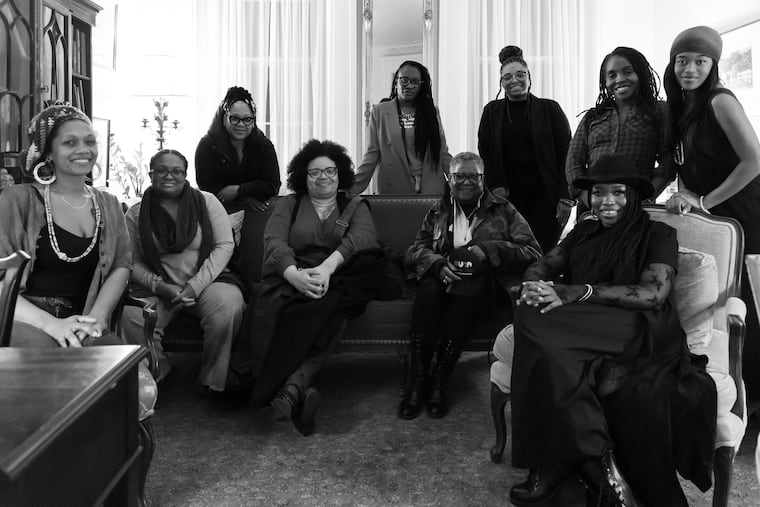For female creatives, a call to (non) action
Women are expected to work for the benefit of others, with no thought to the value of rest and retreat. Maya Angelou knew the importance of that, and we are heeding her call.

We can hear her voice now.
A “Still I Rise” voice, a “Phenomenal Woman” voice, an “I didn’t come to stay” voice.
We heard Maya Angelou’s voice whisper yes the day we asked ourselves if we should collaborate on creating a writers’ respite in her honor. Nothing like this exists for women in Philadelphia, Angelou’s voice said.
It gave us chills.
In our work as artists and booksellers, we are consistently reminded of the impact female writers like Angelou have on our livelihoods. Her books help keep independent bookshops independent. At Harriett’s Bookshop, a recording of Angelou’s voice sometimes plays as customers browse, so they feel the prophetic wisdom of women throughout history that her voice embodies.
Angelou was right when she wrote that women have been expected to work thanklessly for the benefit of others. There is nothing specifically dedicated to supporting women’s self-rejuvenating activities like reading, writing, rest, and retreat.
“A day away acts as a spring tonic,” Angelou once wrote. “When I return home, I am always surprised to find some questions I sought to evade had been answered and some entanglements I had hoped to flee had become unraveled in my absence.”
Angelou emphasized the necessity of spaces for women’s self-rejuvenation in an interview we were both familiar with, from the fall 1990 edition of the Paris Review, in which she spoke of renting a hotel room solely for writing and reflection. Our vision was inspired by her transparency about the silent demands of creative practice. Female writers need time and space for solitude. This tool is necessary to nurture the past, present, and future of Philadelphia’s influential literary voices.
We agreed to partner and expand the idea of the writers’ respite from a hotel room for one or two writers to a vision that included as many women as we could host. In the end, we gathered poets, journalists, memoirists, musicians, foodies, editors, mothers, activists, and more. A Room to Write (and Rest!) was born on March 1 with participants ranging from cafe owner and poet Blew Kind to novelists Camille Acker, Whisper Black, and Star Jiggetts, multimedia artist and activist Sannii Crespina-Flores, photographer Andrea Walls, artist and writer Donyae Coles, chef Tonia Renae, vocalist and songwriter Seraiah Nicole, event host and emcee Starfire, author and playwright Lorene Cary, and poets Pheralyn Dove, Ari Dubois, and Tamara Muhammad.
Female writers need time and space for solitude.
Our mission was to cultivate a space that mirrored the multifaceted brilliance of Angelou and the countless women like her who navigate various social roles: partners, parents, community members, creators. To honor these literary women, we decided we would provide a sanctuary of rooms in an 18th-century mansion in Center City, complete with tailored amenities: a meditation room, flowers, optional workshops, a private chef, a personal band, journals, and — of course — books.
We are grateful to our supporters at the Museum of Black Joy, Women’s Way, Harriett’s Bookshop, Tiny Farm Wagon, and the Leeway Foundation for answering our call to donate to support this endeavor.
Yet, as we ended the weekend, we — the organizers with families, businesses, nonprofits, and our own creative practices — were exhausted. Of course, we were tired: We were two women volunteering to apply our personal resources to a huge structural problem. What did that mean for the future? Where was the energy to celebrate and document this historic gathering of literary women? Where would we find the resources to continue?
Philadelphia has been a cradle for women’s literary genius since its inception, but look around: Where are our foundations, our monuments to honoring and supporting our contributions? We don’t have a single federal holiday named after a woman, despite our ongoing efforts to make Harriet Tubman Day (March 10 — the anniversary of her death) a federal holiday.
As we reflect on the daily struggles of women everywhere, we realize that a lot needs to change around how we celebrate and nurture our female creatives. It seems counterintuitive that in order to create space for rest, more work needs to be done. In our conversations about how to move forward, we’ve been asking ourselves questions like: How can we make this easier, and who can we ask for support? How can we make the process joyful and sustainable? We know the answers are coming, simply because we’ve begun to ask the right questions.
We encourage local foundations, especially those with a mission to support female artists, to create funds specifically for women’s rest and rejuvenation. But even if no one else hears it, we hear Angelou’s call to nonaction. In our haste to address the issue, we almost missed her call to rest. As we continue to gather resources to build these experiences for other female writers, we are also going to take our own medicine. We pledge to make time to step away, journal, rest, sleep, and all the other things we need to feel healthy, human, connected, and creative. We will continue to do what we can to help build a healthy creative ecosystem for women from the inside out.
Our city’s history is rich with literary icons, yet the absence of dedicated resources hinders the emergence of future Maya Angelous. We trust ourselves — and you — to make it right. But we’re taking a few days off first. We encourage you to do the same.
Jeannine A. Cook is the owner of Harriett’s Bookshop in Fishtown. Misty Sol is an artist based in West Philly.